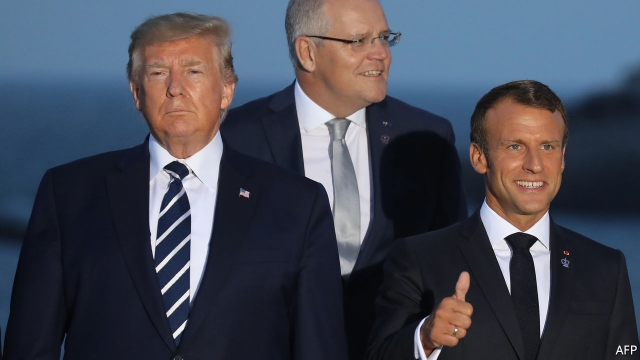These days, that Donald Trump has not walked out constitutes a triumph
A YEAR ago, at the previous G7 meeting in Canada, a single image captured the mood. It showed Germany’s Angela Merkel leaning imploringly over a table towards a seated Donald Trump, his arms resolutely crossed. Shortly afterwards, the American president walked out, and pulled out of a pre-agreed final communiqué.
It is a telling reflection of the current state of multilateral affairs that, at this year’s G7 summit in the French resort of Biarritz, which began on August 24th, it was considered a minor diplomatic triumph merely that, by the end of day two, the American president was still co-operating.
This year’s gathering, which brings together the leaders of America, Canada, Japan, Germany, France, Italy and Britain, began on a more upbeat note. In a tweet, Mr Trump took a swipe at what he called the “Fake and Disgusting News” media and their predictions of disaster, insisting that “we are having very good meetings, the Leaders are getting along very well”.
Before the summit officially began on August 24th, Mr Trump agreed to an impromptu seafront lunch with Emmanuel Macron, which lasted two hours. As the pair sat down to eat à deux, the American president conceded that he and the French president do occasionally “go at each other a little bit”, but insisted that they had a “special relationship” and “actually have a lot in common”.
Behind the cordial tone, the points of friction—over climate change, trade, taxation of tech firms, Iran, Russia and Ukraine—were well known. At the first summit dinner, Mr Trump argued that Russia should be invited back into the group, from which it was evicted after the annexation of Crimea. Other leaders are against letting Russia back in. The White House even complained over the weekend that the formal G7-summit subjects chosen by the French, such as African development or gender equality, were too “niche”.
The summit host, Mr Macron is painfully aware that his efforts over the past two years to charm and cajole Mr Trump into better behaviour have largely been in vain. He learned this the hard way last year when the American president pulled out of the Joint Comprehensive Plan of Action (JCPOA)—a multinational anti-nuclear proliferation deal signed between Iran and six world powers in 2015—shortly after Mr Macron visited Washington hoping to persuade him otherwise. This time, the French president said ahead of the G7 summit that there would not even be a final communiqué, as it would in any case be “pointless”.
Yet if the French have had to scale back their ambitions, they have also been trying hard to help create the conditions for defusing global tensions on a number of these points. Mr Macron is in particular seeking to carve out a mediating role over Iran. The most unexpected moment at the summit came on the afternoon of August 25th, when Javad Zarif, the Iranian foreign minister, turned up in Biarritz to meet the French foreign minister, Jean-Yves Le Drian, as well as Mr Macron.
This coup de théâtre comes after intense French diplomatic efforts to stop the conflict with Iran escalating. The French president had hosted Mr Zarif for talks in Paris on August 23rd, on the eve of the G7 summit. Mr Macron’s diplomatic adviser, Emmanuel Bonne, has twice flown off to Tehran in recent months. The Elysée said that Mr Trump had been informed in advance of Mr Zarif’s visit. Mr Macron hopes to find a way to keep the deal, or a form of it, alive. To this end, he is seeking, however improbably, to broker concessions from both the Iranians (over its nuclear programme) and the Americans (over sanctions).
The French president may be over-reaching. His efforts with Mr Trump have failed before. And he has little track record as an intermediary. Assuming that Mr Trump stays in Biarritz until the end of the summit on August 26th, however, it may not have been time wasted. If nothing else, this summit suggests that Mr Macron is growing into a role as a European leader who may not always get it right, but is trying to use the multilateral system to ease tensions and defend the liberal order.

